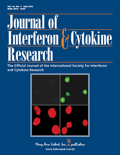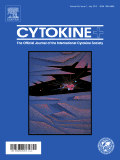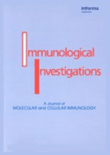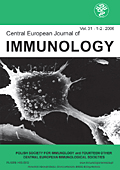
JOURNAL OF INTERFERON AND CYTOKINE RESEARCH
Scope & Guideline
Unlocking the Mysteries of Immune Signaling
Introduction
Aims and Scopes
- Cytokine Biology:
In-depth studies on the biology of various cytokines, including their roles in immune responses, inflammation, and disease pathogenesis. - Interferon Research:
Research focusing on the mechanisms of action, therapeutic applications, and novel developments related to interferons, including their use in treating viral infections and cancers. - Clinical Implications of Cytokines and Interferons:
Investigations into how cytokines and interferons influence disease outcomes, patient responses to therapies, and their potential as biomarkers for various conditions. - Molecular Mechanisms and Pathways:
Analyses of signaling pathways and molecular interactions involving cytokines and interferons, contributing to our understanding of immune regulation and pathology. - Therapeutic Developments:
Exploration of new therapeutic approaches and interventions targeting cytokines and interferons to improve treatment outcomes in diseases such as cancer, autoimmune disorders, and infectious diseases.
Trending and Emerging
- Cytokines and COVID-19 Research:
There is a significant increase in studies investigating the roles of cytokines in the context of COVID-19, focusing on cytokine profiles, immune responses, and therapeutic implications. - MicroRNA and Cytokine Interactions:
Research exploring the interplay between microRNAs and cytokines is gaining traction, indicating a growing interest in post-transcriptional regulation mechanisms. - Personalized Medicine Approaches:
Emerging studies are focusing on personalized medicine strategies involving cytokines and interferons, aiming to tailor therapies based on individual patient profiles. - Cytokines in Metabolic Disorders:
There is a rising interest in the role of cytokines in metabolic disorders, linking inflammation with conditions such as obesity, diabetes, and cardiovascular diseases. - Immunotherapy and Cytokine Modulation:
The exploration of cytokine modulation as a strategy in immunotherapy for cancer treatment is increasingly prominent, reflecting advancements in cancer research and treatment methodologies.
Declining or Waning
- Basic Cytokine Functionality Studies:
There has been a noticeable reduction in studies solely focused on the basic functionalities of cytokines without a clinical or therapeutic context, as the field moves towards more applied research. - Older Interferon Therapies:
Research centered on older interferon therapies, particularly those that have been largely replaced by newer treatments, is becoming less prevalent, indicating a shift towards novel therapeutic approaches. - General Immune Response Mechanisms:
Papers that discuss broad immune response mechanisms without specific reference to cytokines or interferons are less common, suggesting a narrowing focus to more targeted studies. - Historical Perspectives on Cytokine Research:
Articles that provide historical insights or retrospective analyses of cytokine research trends are appearing less frequently, as the journal emphasizes current research and applications.
Similar Journals

CYTOKINE
Shaping the future of cytokine science with impactful research.CYTOKINE is a prestigious peer-reviewed journal published by Academic Press Ltd - Elsevier Science Ltd, dedicated to advancing the field of immunology, biochemistry, and related biomedical sciences since its inception in 1989. With an ISSN of 1043-4666 and an E-ISSN of 1096-0023, this journal serves as a vital resource for researchers and professionals alike, offering cutting-edge research findings that delve into the roles and mechanisms of cytokines in health and disease. Recognized for its impactful contributions, CYTOKINE currently ranks in the Q2 quartile across several categories, including Biochemistry, Hematology, and Immunology, indicating its significant influence in these fields. Despite not offering open access, the journal maintains a high-quality standard, as evidenced by its robust Scopus rankings, including a notable 80th percentile in Medicine and Hematology. Researchers and students are encouraged to explore the latest findings and methodologies via CYTOKINE, as it continues to shape the future landscape of cytokine research and application.

IMMUNOLOGICAL INVESTIGATIONS
Elevating Immunological Knowledge for Professionals and ScholarsIMMUNOLOGICAL INVESTIGATIONS, published by Taylor & Francis Inc, is a leading journal in the field of immunology and related medical sciences, with an established presence since 1972. With a focus on cutting-edge research and critical insights in immunological methods and theories, this journal serves as a pivotal platform for researchers, professionals, and students alike. Though it currently holds a Q3 ranking in Immunology and a Q2 ranking in miscellaneous medicine as of 2023, its Scopus rank of #129 out of 236 reflects its dedication to advancing the understanding of immune responses and therapies. The journal's commitment to rigorous peer review and high-quality publications enables it to remain relevant and influential in the ever-evolving landscape of immunological research. Subscription is required to access its extensive archive, which spans critical developments in the field of immunology from 1972 to 2024.

Immunotherapy Advances
Advancing the frontier of immunology with cutting-edge research.Immunotherapy Advances, published by Oxford University Press, stands at the forefront of the rapidly evolving field of immunology and microbe interactions, focusing specifically on novel immunotherapeutic strategies and their clinical applications. Established in 2021, this peer-reviewed journal aims to disseminate high-quality research that contributes to the understanding and advancement of immunotherapeutic techniques, potentially transforming patient care in immunology. With a current Scopus rank of #140 out of 236 in the realm of Immunology, placing it in the 40th percentile, Immunotherapy Advances is positioned to be an integral resource for researchers, healthcare professionals, and students eager to stay updated with groundbreaking findings and methodologies. The journal is dedicated to fostering innovative discussions and collaborations, ensuring open access to vital research that influences treatment paradigms globally.

AMERICAN JOURNAL OF RESPIRATORY CELL AND MOLECULAR BIOLOGY
Exploring the Molecular Mechanisms of RespirationThe AMERICAN JOURNAL OF RESPIRATORY CELL AND MOLECULAR BIOLOGY, published by the esteemed American Thoracic Society, is a premier platform dedicated to advancing knowledge in the fields of pulmonary and respiratory medicine, cell biology, and clinical biochemistry. With an impressive impact factor and recognition as a Q1 journal in multiple categories for 2023, it ranks among the top tier of scholarly publications, evidencing its influence and contribution to the scientific community. Since its inception in 1989, the journal has provided a critical forum for researchers and professionals to disseminate innovative findings and pivotal reviews, driving forward the frontiers of respiratory biology. While the journal currently operates under traditional access mechanisms, it seeks to bridge gaps in research by presenting high-quality articles that address vital health challenges. As a key resource for both established researchers and emerging scholars in molecular biology and respiratory science, this journal plays a pivotal role in shaping the future of respiratory health advancements.

Journal of Innate Immunity
Transforming Knowledge in Immunology and AllergyThe Journal of Innate Immunity, published by KARGER, stands at the forefront of immunological research, focusing on the critical role of innate immunity in health and disease. With its Open Access model since 2019, the journal ensures broad dissemination of groundbreaking findings and facilitates global scholarly communication. Based in Switzerland and indexed with an impressive Q1 category ranking in Immunology and Allergy for 2023, it occupies a prominent position in the scientific community, ranked #47 out of 233 in the field. Researchers, professionals, and students alike benefit from accessing high-quality, peer-reviewed articles that span from 2008 and will continue to evolve until 2024, reflecting the latest advances and challenges in innate immunity. As an essential resource, it addresses critical questions and shares innovative insights that push the boundaries of our understanding in this dynamic field.

HUMAN IMMUNOLOGY
Fostering Knowledge in Immune Health and DiseaseHUMAN IMMUNOLOGY, published by Elsevier Science Inc, serves as a critical platform for disseminating research in the fields of immunology and allergy, as well as various aspects of miscellaneous medicine since its inception in 1980. With an ISSN of 0198-8859 and E-ISSN 1879-1166, this journal is pivotal for researchers and practitioners looking to advance their understanding of human immune responses and related conditions. The journal currently holds a respectable position within its field, as highlighted by its 2023 Scopus ranks—#114/233 in Immunology and Allergy and #132/236 in Immunology and Microbiology. Moreover, it maintains a Q2 quartile ranking in both Immunology and Allergy and miscellaneous Medicine, underscoring its influence and reach within the scientific community. Although it does not currently offer Open Access options, HUMAN IMMUNOLOGY remains dedicated to providing valuable insights and fostering academic discourse within its discipline, characterized by a rigorous peer-review process and a focus on innovative research trajectories.

Innate Immunity
Exploring the Depths of Innate ImmunityInnate Immunity, published by SAGE Publications Ltd, serves as a vital platform for disseminating cutting-edge research in the fields of immunology, microbiology, cell biology, and infectious diseases. With an ISSN of 1753-4259 and an E-ISSN of 1753-4267, this journal has been a prominent contributor to the academic community since its inception in 1996, focusing on the innate immune response and its implications for health and disease. Holding a respectable impact factor and categorized in the Q2 and Q3 quartiles across various relevant domains, Innate Immunity ranks competitively in major databases, including Scopus, where it appears in the top 75th percentile for Infectious Diseases. Researchers and professionals are encouraged to explore its wealth of articles that are pivotal in bridging fundamental immunology with clinical applications, fostering a deeper understanding of immune mechanisms vital for combating human diseases.

Genes & Diseases
Innovating solutions through genetic research and discovery.Genes & Diseases, published by KEAI PUBLISHING LTD, is a premier open-access journal dedicated to advancing the fields of genetics, biochemistry, and molecular biology. Established in 2014 and headquartered in Beijing, China, this journal has quickly risen to prominence, securing a place in the prestigious Q1 quartile in Biochemistry and Genetics (clinical), as well as Q2 in Cell Biology and Q1 in Molecular Biology as of 2023. With a commitment to disseminating cutting-edge research, Genes & Diseases serves as a critical platform for researchers, professionals, and students alike, ensuring that high-quality scientific work is openly accessible to the global community. The journal's exceptional impact is underscored by its selective Scopus rankings, which reflect its influence and relevance in key scientific domains, making it an essential resource for those exploring the intersections of genetics and disease pathology.

Autoimmune Diseases
Pioneering insights into autoimmune health.Autoimmune Diseases is a leading open-access journal published by Hindawi Ltd, dedicated to advancing the understanding and treatment of autoimmune disorders. Since its inception in 2010, this journal has provided a vital platform for researchers, clinicians, and students to share innovative findings and insights from the field of immunology. With an impressive Scopus ranking that highlights its relevance, particularly in the areas of Immunology and Microbiology and Immunology and Allergy, Autoimmune Diseases occupies a key position in the scientific discourse, ranking in the top quartiles across various categories. Researchers publishing in this journal benefit from a wide audience and high visibility, reflecting the increasing importance of understanding autoimmune diseases in today’s health landscape. Accessible to all, the journal promotes collaborative research and discussion, making it an essential resource for anyone dedicated to the study and management of autoimmune conditions.

Central European Journal of Immunology
Shaping the Future of Immunology Through Open AccessCentral European Journal of Immunology is a premier publication dedicated to advancing the field of immunology and allergy research. Established in 1996 and published by TERMEDIA PUBLISHING HOUSE LTD, this open access journal has consistently provided a platform for innovative research and comprehensive reviews since its transition to open access in 2002. With an ISSN of 1426-3912 and E-ISSN of 1644-4124, it embraces a global readership while being rooted in Poland. The journal, with a notable Q3 ranking in both the categories of immunology and allergy in 2023, positions itself within the competitive landscape of scientific discourse, as reflected in its Scopus rankings. Designed for researchers, professionals, and students, the Central European Journal of Immunology not only disseminates significant findings but also fosters collaboration and innovation in the immunological sciences, making it a vital resource for those seeking to stay current in this rapidly evolving field.